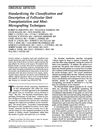 72 citations,
June 2013 in “Journal of feline medicine and surgery”
72 citations,
June 2013 in “Journal of feline medicine and surgery” The document says to treat cat fungal infections with medicine and clean the environment, noting that cats without symptoms can still spread it to humans.
 37 citations,
August 1991 in “International Journal of Dermatology”
37 citations,
August 1991 in “International Journal of Dermatology” Most tinea capitis cases in southern Taiwan were in adult women, mainly caused by Trichophyton violaceum.
 33 citations,
September 1998 in “Dermatologic Surgery”
33 citations,
September 1998 in “Dermatologic Surgery” Surgeons suggested a standard system for hair transplant methods to improve communication and results.
 29 citations,
October 2012 in “Anais Brasileiros De Dermatologia”
29 citations,
October 2012 in “Anais Brasileiros De Dermatologia” Diagnosing hair loss disorders needs clinical, dermoscopic, and histological differences, and checking menstrual cycle, weight changes, drug therapy, and nail changes.
 27 citations,
September 2012 in “Dermatologic Clinics”
27 citations,
September 2012 in “Dermatologic Clinics” The document concludes that using specific tools and tests is essential for identifying the cause of hair loss and deciding on the right treatment.
27 citations,
February 1991 Cuticle damage doesn't affect hair's tensile strength; the cortex is responsible for it.
 21 citations,
March 2006 in “Seminars in Cutaneous Medicine and Surgery”
21 citations,
March 2006 in “Seminars in Cutaneous Medicine and Surgery” Most hair loss disorders can be accurately diagnosed and treated in an outpatient setting.
 14 citations,
March 2017 in “Plastic and reconstructive surgery. Global open”
14 citations,
March 2017 in “Plastic and reconstructive surgery. Global open” Hair follicle damage happens during hair transplants and can impact success; better surgical methods are needed.
 13 citations,
July 2016 in “Pediatric Dermatology”
13 citations,
July 2016 in “Pediatric Dermatology” Loose Anagen Syndrome is more common in females and may be inherited, often confused with other hair disorders, and lacks evidence for biotin treatment effectiveness.
 13 citations,
July 2004 in “Skinmed”
13 citations,
July 2004 in “Skinmed” Common types of non-scarring hair loss have various causes and treatments, but more effective solutions are needed.
 10 citations,
September 2020 in “Computational and Mathematical Methods in Medicine”
10 citations,
September 2020 in “Computational and Mathematical Methods in Medicine” Researchers developed an algorithm for self-diagnosing scalp conditions with high accuracy using smart device-attached microscopes.
 10 citations,
May 2018 in “Forensic Science International”
10 citations,
May 2018 in “Forensic Science International” Shrunken heads retain some facial features and hair characteristics, allowing for limited individual identification.
9 citations,
August 2021 in “Journal of clinical medicine” Pili torti is a rare condition where hair is twisted and breaks easily, often linked to genetic disorders or other health issues.
 8 citations,
July 2016 in “Hair transplant forum international”
8 citations,
July 2016 in “Hair transplant forum international” FUT-MD hair transplants have higher follicle survival rates than FUE transplants.
 8 citations,
January 2007 in “Mycoses”
8 citations,
January 2007 in “Mycoses” A man's scalp infection, mistaken for bacterial, was actually a rare fungal infection treated successfully with antifungal medication.
 8 citations,
March 1979 in “International Journal of Dermatology”
8 citations,
March 1979 in “International Journal of Dermatology” Dr. Vera H. Price's 1979 work emphasizes the importance of accurate diagnosis and personalized treatment for hair loss.
 6 citations,
January 2010 in “Actas Dermo-Sifiliográficas”
6 citations,
January 2010 in “Actas Dermo-Sifiliográficas” Follicular Unit Hair Transplantation has become a less invasive procedure with natural results, suitable for certain adults with hair loss.
 5 citations,
April 2019 in “Plastic and reconstructive surgery. Global open”
5 citations,
April 2019 in “Plastic and reconstructive surgery. Global open” Fractional lasers could help hair regrowth in androgenic alopecia, but more research is needed to confirm their effectiveness and safety.
5 citations,
May 1994 in “Facial plastic surgery clinics of North America” Minoxidil was promising for treating male and female pattern baldness in 1994, but more research on genetics and other treatments was needed.
 4 citations,
July 2022 in “Veterinary medicine international”
4 citations,
July 2022 in “Veterinary medicine international” Mange in rabbits is a serious disease that can spread to humans and is treated with medications and supportive care.
 4 citations,
November 2017 in “Hair transplant forum international”
4 citations,
November 2017 in “Hair transplant forum international” Hair transplants are effective for some women and many male-to-female transgender patients if done carefully by an experienced team.
 4 citations,
February 2000 in “Dermatologic Surgery”
4 citations,
February 2000 in “Dermatologic Surgery” The document concludes that Follicular Unit Hair Transplantation is a more precise and effective method for hair restoration.
 3 citations,
April 1978 in “PubMed”
3 citations,
April 1978 in “PubMed” The study concludes that traction alopecia, caused by hair styling, can help understand telogen effluvium, a condition of excessive hair loss.
2 citations,
February 2013 in “Journal of the Saudi Society for Dermatology & Dermatologic Surgery” New hair spray caused a hair shaft disorder.
 February 2022 in “International journal of research in dermatology”
February 2022 in “International journal of research in dermatology” The document concludes that proper diagnosis and treatment of hair shaft disorders require understanding their unique causes and avoiding hair-damaging practices.
 September 2021 in “Mağallaẗ al-Muẖtar li-l-ʿulūm”
September 2021 in “Mağallaẗ al-Muẖtar li-l-ʿulūm” Two sisters have rare hair disorders causing short, fragile, kinky hair.
 March 2019 in “Zenodo (CERN European Organization for Nuclear Research)”
March 2019 in “Zenodo (CERN European Organization for Nuclear Research)” Both Ayurvedic treatments improved hair fall, with Shirodhara being especially effective.
April 2016 in “Journal of the American Academy of Dermatology” A 4-year-old girl had a rare hair disorder affecting only part of her scalp.
 January 2009 in “Hair transplant forum international”
January 2009 in “Hair transplant forum international” Realistic expectations about hair density and coverage lead to higher patient satisfaction in hair transplant surgery.

Hair restoration surgery has improved to transplant hair in natural groupings, but it's labor-intensive and can't fully restore normal hair density.

























